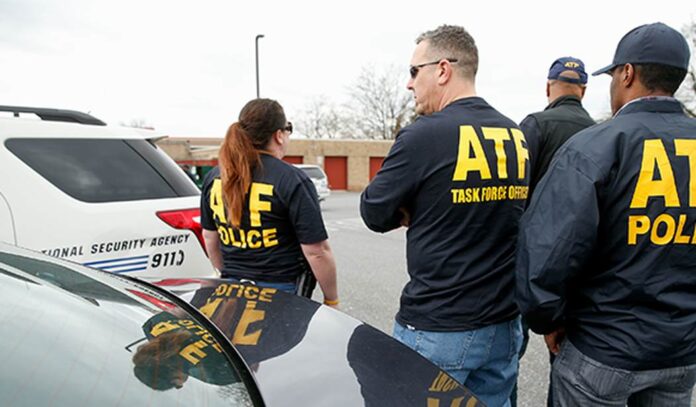The six budget bills unveiled by House and Senate leadership over the weekend may not slash spending overall, but the measures do contain at least one targeted budget cut that will meet with the approval of most Second Amendment advocates.
The six bills in the $467.5 billion appropriations package will fund several departments through the end of FY 2024, including the Department of Justice, and while the bills amount to a .03 percent spending increase compared to last year, some agencies are going to be doing more with less if the measures are adopted by the House and Senate this week.
Republicans highlighted cuts in the Commerce-Justice Science bill to the FBI and the Bureau of Alcohol, Tobacco, Firearms and Explosives, and to the EPA in the Interior-Environment bill, as big wins of their own in the legislation, along with gun-related policy riders.
GOP negotiators said the package would reflect the first overall cut to nondefense, non-VA spending in almost a decade. For example, the Commerce-Justice-Science bill has an almost $2.5 billion, or 3 percent cut.
“House Republicans secured key conservative policy victories, rejected left-wing proposals, and imposed sharp cuts to agencies and programs critical to President Biden’s agenda,” Speaker Mike Johnson, R-La., said in a statement.
… House Republicans pointed to reductions to three major agencies as wins in the legislation, including a 7 percent cut to the ATF and a 6 percent cut to the FBI.
The FBI’s construction account is facing a whopping $621.9 million, or 95 percent, cut, according to a GOP summary, as the agency faces criticism from Republicans for its investigations of former President Donald Trump.
As nice as it might have been to see the ATF’s budget zeroed out, that wasn’t ever in the cards with the short-term spending bills. And with AFT Director Steve Dettelbach pushing for Congress to give the agency more money during his appearance on ‘Face the Nation’ on Sunday, a seven percent cut sounds pretty good, though I’m curious to know if the cuts are directed at any particular area of the agency or if its just an across the board reduction in spending.
In addition to tightening the ATF’s belt a couple of notches, the spending bills also include another provision that gun owners have been demanding.
Republicans successfully secured a rider in the Military Construction-VA bill that would prevent the VA from automatically sending veterans’ names to the Justice Department for a criminal background check if they ask for help managing their finances.
That’s a very good thing. The gun control lobby has been trying for years to expand the number of prohibited persons by adding those who’ve had fiduciaries appointed to help with their finances; first with Social Security Disability recipients, and more recently through the VA’s fiduciary process. It doesn’t matter if the veteran is still mentally competent. As far as the VA is concerned, once a fiduciary has been appointed, veterans like Corey Briest have lost their right to keep and bear arms forevermore.
In 2005, National Guardsman Corey Briest survived a roadside bomb blast that killed three of his fellow service members in Baghdad. He returned home to South Dakota blind and dependent on a wheelchair — with a severe traumatic brain injury. According to his wife Jennifer, most of his mental faculties are intact. He helps his children with schoolwork, takes an interest in household finances and keeps track of family birthdays.
“I don’t care if you remember what you had for lunch an hour ago or what the date is today. You remember the important things. That would have been harder to lose than anything else,” she said.
But because of his injuries, the Department of Veterans Affairs told the Briests that they needed to appoint a fiduciary, someone to manage Corey’s financial affairs. As a result of the change, a VA field examiner told Corey he could no longer own or possess guns.
“Corey was like, ‘Well, wait. I have my grandpa’s gun. It was handed down to me. I’m going to hand it down to my son one day,’” Jennifer recalled. “The field examiner was so rude about it. Wasn’t compassionate to Corey. Wasn’t explaining things. He was just like, ‘Nope, you can’t have that…that’s against the law.’”
Which is exactly what the gun control lobby wants.
“Many of the people that are reported under these systems are a danger to themselves or others. We just simply don’t know which ones,” said Lindsay Nichols, federal policy director with the Giffords Law Center to Prevent Gun Violence. “So these include individuals with dementia, serious mental illnesses, bipolar disorder, severe brain trauma. These disabilities alone don’t make a person dangerous. But combined with easy access to guns because they can endanger the public.”
If family members or law enforcement believe that a particular individual poses a danger to themselves or others, there’s already a way for them to be formally adjudicated by a judge and declared a prohibited person. But the VA has adopted a much simpler standard that even gun control activists like Nichols admit is catching veterans who aren’t dangerous and depriving them of their right to keep and bear arms.
Stacey-Rae Simcox of the Veterans Legal Clinic at Stetson University said the VA should have to go to court to take someone’s gun rights away.
“Every other American gets that benefit, except for the ones who signed up to defend the United States of America,” she said. “That doesn’t make any sense.”
Ultimately, Simcox said, difficulty with finances isn’t a reliable predictor of danger.
“VA doesn’t determine that veterans are mentally incompetent — just financially. They do it regularly enough that a lot of veterans are afraid to even go for mental health benefits or care at the VA because they’re worried they’re going to lose their right to carry a firearm and protect themselves.”
There’ll be plenty of things to complain about in these spending bills, but the cuts to the ATF’s budget and the inclusion of this rider are two legitimate wins for Republican negotiators. The anti-gun lobby won’t be happy about seeing their favorite law enforcement agency hit with a seven percent reduction to its bottom line, and safeguarding the Second Amendment rights of our veterans is a big hit to the efforts of groups like Giffords and Everytown, who are intent on using every tool they can to deprive as many Americans as possible of their fundamental right to gun ownership.




